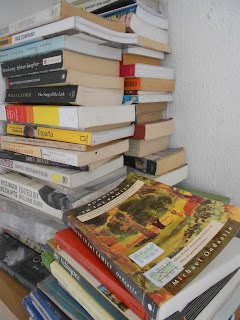Thursday, August 29, 2013
Sunday, August 18, 2013
Thursday, August 15, 2013
Identity Crisis
I like it when they call me Germelina. I happened to sit in the poet Allan Popa’s class, “Malikhaing Pagsulat,” in the summer of 2009 and I was not “Ma’med” there. I was with a bunch of undergraduate kids--they called me Germelina. When we had poetry readings, and they were whispering to each other whose poem was being read, the guy named Mike or Cedric or any such name, would tell his classmate, “That’s Germelina’s” and I felt like I was one of them, young again—am I fooling myself?
So, who is this woman they call Ma’m now? Sitting here at a table, with a wyteboard pen and eraser in her hand, pretending she had some intimate knowledge about the world?
What comes to mind was Reina, my editor, the second editor I ever had in my life, when I was still a young reporter and now, I’m not that young anymore, but still I remember that poet-writer-columnist the first beautiful real feminist I ever encountered. She used to tell us inside the newsroom, “Don’t call me, Ma’m, call me Reina,” and that’s how we called her Reina; though we were uncomfortable about it at first, because she was so ahead of us in years and intelligence, she deserved to be Ma’med.
But Reina was not that ordinary kind of Ma’m. She was fond of wearing shorts and thick glasses, and she had her Walkman always, the tiny wirings dangling down her ears somewhere, and once or twice, she jaywalked to cross the street to Sunstar office at Jones Avenue(this was in Cebu) without using the pedestrian lane and got caught by the traffic enforcers, whom she wrote about in her column the next day, praising them for doing such a good job of catching her. One time, as the story goes, the guard at the UP campus in Lahug, where she handled a journalism class, refused to let her in because she was wearing shorts and her usual T-shirt, complete with a Walkman, with the earphone on her ears, and those sunglasses. In her class, she also told her students, “Don’t call me, Ma’m, call me Reina,” but I heard she did not last very long there because the students petitioned her, they said she smoked in class and uttered expletives, which people were saying was okay at Diliman but not here in Cebu, it’s the province, the barrio, you see. I did not Ma’m Maritess, my first editor, the editor I can always claim to have taught me how to write a story. I did not Ma’m her because—well, she had a way of telling you something and you can't do anything else but obey and the first thing she told me, as I sat near her desk, where she edits her stories, was not to call her Ma'm—she was just three or four years ahead of me when I was still a reporter fresh out of school, entering a newsroom, feeling uncertain about the world.
Though Maritess deserved to be Ma’med every inch of the way: the way she imposed the editorial discipline, the way she taught me how to deal with sources, I owed it to her my beginnings in the newsroom. “Tell that source of yours, if she wanted a copy of your story, tell her to talk to the editor," she would say, with the usual pout in her mouth, her head tilted at an angle, "Or better tell her, we don’t do that in the newsroom, we have our editorial standards, but if you are really so desperate to read my story before publication, talk to the editor.” And I know some of them did not but some of those who did must have suffered such a lashing.
Monday, July 15, 2013
Reading Rebecca West
When things were becoming almost unbearable, I came upon Rebecca West's "The Fountain Overflows" tucked in a shelf under Karl's table. Paper-wrapped, and still inside the paper bag when I bought it, the book features a painting of a woman before a piano,and several other smaller paintings on its cover. I started reading, and immediately got immersed into another world: the world of Rose and her twin sister Mary, their sister Cordelia and baby brother Richard Quinn, their philandering no good of a father and the mother they love so much. At least, I forgot about my pain, if only for a moment.
Sunday, July 14, 2013
Blogs That Keep Me Whole
Sometimes when things turn totally insane and horrifying, I turn to blogs. Some people tend to dismiss blogs, but I find some deep sense of connection with these few blogs that I follow. At times, when things really go crazy, I turn to them to make sense of my world. I never mentioned this to anyone before. This used to be my best kept secret. But today, I honor these blogs for keeping me alive:
Daryll Jane's Free Migrant paints a turbulent inner landscape, something that I can identify with and freely enter; Prateesh's Room With a View is a refuge, Sheilfa's Tumbang Preso, another sanctuary fenced by sharp objects, Maryanne Moll's "Sensibilities," particularly her "My street, myself," or "I, watcher," a dream.
Sometimes, when I feel particularly sad and disturbed, I turn to Ma'm Merlie's poetry, and end up crying but no longer sad; and Ninotchka Rosca's Lily Pad, helps me get back my bearing; helps me think.
To all these writers and bloggers, thank you for writing what you write, thank you for making sense of the world.
Saturday, July 13, 2013
The Guy whose back was turned to me and Prateesh
Early in June, as soon as we stepped out of the cab inside the Ateneo campus, the puzzle was finally resolved. The man in robes, whose back we can see from the windows of the Rizal Library, where Prateesh and I used to look out, wondering and trying to figure out who the guy in robe was and never had enough time to find out until it was time for us to fly home, was actually St. Thomas More, the best friend of Henry VIII, who died in a guillotine upon Henry VIII's order.
Near the statue, an epitaph said something about Thomas More, a loyal friend to the King of England, but a more loyal servant to God.
I came upon Thomas More, not through the eyes of faith, I used to be an agnostic and now I am a pagan; but I came upon Thomas More's story through my depraved fascination of Henry VIII, the decadent monarch. Standing upon the grounds of Ateneo, carrying in my hands a box of Davao golden pomelos, which they said were the sweetest on earth, I realized how small a world it was, for Toto and I were going upstairs the social sciences building to see dr. V, Thomas More's memory right before me, and I wish Prateesh were there with me.
Wednesday, June 19, 2013
Monday, June 17, 2013
What am I doing here?
For two or three times now, at a particular hour at night, I have watched myself multiply four or five times before the wall as I took my descent from the fifth floor of this university building to the ground floor. I see the images of myself—five of them, of the same height and build—staring back at me, with a look that asked, “What are you doing here?” I did not know the answer. But the mirror on the wall seemed to be telling me what I certainly feel: I was only getting myself sliced; cut up to pieces.
The stairway looked dark and abandoned. Everybody still around at this time of night was rushing toward the elevator. Everything about the whole place looked squeaky and clean, which to one more accustomed to chaos like me, felt quite alienating.
If I had to work like this, would there be enough time for me to write? Would I even be able to talk about narrative techniques in a class still about to write a breaking story?
I was actually thinking of another university very close to the sea, whose turn-of-the-century campus was lined down by dark-limbed acacia trees, and the wooden buildings, particularly Katipunan Hall, looked like the exact place where Andres Bonifacio might just have held a meeting to overthrow the government of Spain. Was it Sheilfa, or was it Claire, who once said it was the only university that celebrated madness as a sign of genius, the madder you think there, the more accepted you get. Am I exaggerating? Is my own memory playing tricks on me, just like the mirrors on the stairway wall?
But from the windows of that university’s huge library, near the shelves and corners darkened with the languishing volumes of Balzac and Voltaire, I used to watch the green soccer field teeming with young athletes. I, too, considered myself mad, and remember that university with fondness.
In the place where I am now, they try hard to suppress madness. They ask you to dress well, to conform, to comb your hair, get a husband, make a happy home, such things. Sheilfa was mad, schizophrenic even, that’s why she’s really a good writer. Unlike me, she’s not afraid to offend. The greatest thing she ever brought to the office was a copy of Granta featuring an old rat. I loved reading about that rat, I can’t help crying at the end. Yet, Sheilfa was seized by sudden madness, and thought I found her anguish hilarious. She thought I was laughing at the sight of her hauling her delightful books near the office sofa. Perhaps, I was writing so badly, the meaning of my text spread beyond its original intention.
She never knew I lived the same life on the edges, and a delight offered by her books, made me last one more day.
Thursday, May 30, 2013
Monday, May 27, 2013
Friday, May 10, 2013
On the way to a Rainforest
We went to what I called the secret rainforest in Upper B'la, where the land sloped abruptly down to the Balawanan river about 100 to 200 feet below. I can't be exact about its height. Actually, I can't even tell a foot from a banana, so, don't trust me when I say 200 feet, maybe, it's even higher. But the cliff always had this effect of making me feel breathless as a child, both for its sheer height and for the landscape it offers. It had the same effect on me now.
When I was a child, I remember coming down here with my Pa, seeing the water falling by the steep slopes of the cliff, gushing like little waterfalls. I used to see gigantic bird's nest fern and other giant ferns as big as banana stalks thriving by the wayside. I remember the clear, rushing waters of the Balawanan, the pebbles the color of granite we used to play with. Now, the ferns were almost gone and the river was heavily silted, an island of rocks and debris had formed in the middle. But climbing down this place was such a great moment for me. The gigantic timber trees thriving near the rocky brook that ran its course through the ravines felt as solemn as a cathedral. I would love to come back here over and over again.
Sunday, April 14, 2013
Sickbed
It was a rare pleasure to have Sean read to me while I was sick. He would have refused but I said, "When you were a baby, you used to stop me and wrestle with me every time I read a book. So, now, it's your turn to please me. Just one page, please."
I closed my eyes and listened to the first paragraphs of Milan Kundera's "The Great Return," published by old Granta. First his voice sounded diffident, unsure. Then, he developed confidence and became daring as he gained paragraphs. My headache started to subside. Eventually, his eyes began to jump. "Voluntarily, not voluntary," I corrected.
He turned to me.
"How come you knew it was 'voluntarily,' not 'voluntary'?" he asked, "Your eyes were closed."
"I simply knew it," I said.
I was about to explain but quickly he cut me short.
"If you already knew everything, even with your eyes closed," he said, "Then, I don't have to read to you at all."
He put the book down and walked away.
Monday, March 25, 2013
Where is Sheilfa?
She vanished after Nico and I appeared lukewarm to her idea of turning the world upside down. The sight of her hauling all her books into the office used to make our day. I am still midway through her old Granta, its pages filled with her marks and comments, which really bothered me as I inched my way through Luc Sante's "Lingua Franca;" her copy of Marcel Proust's "In Search of Lost Time," conveniently gathering dust among the books on top of my cabinet which is not my bookstand, while I watch my dendrobium spikes new blooms right before my eyes, while I water my dillweed, my sage, my basil, my ailing oregano, and my peppermint forever attacked by wilt; while I cooked dishes in the kitchen and blackmailed Sean and Ja to tell me the food is good or else I might not cook again. Where is Sheilfa? She was the only woman who can speak what nobody else I knew dare to speak, with bitterness that could sting the eyes, with so much passion, with so much fury, with so much rage! Where is she?
Saturday, March 23, 2013
Admiring Elizabeth
About a year ago, I was at first intrigued, then, taken aback by the exciting and decadent life of Henry VIII, the English monarch father of the first Queen Elizabeth of England, as portrayed in The Tudors, the historical English drama fiction serialized in UK television created by Michael Hirst, filmed in Ireland, with Jonathan Rhys Meyers playing the character of King Henry VIII.
I was totally enthralled by the character that must have been Henry VIII, how charming and vain he was, how untrammelled in his sexual appetite, how irrational in his statesmanship and in his policy-making, I was willing to be taken in for a voyeuristic ride except for the disturbing scenes which I could not accept: the senseless slaughter of peasants who questioned and opposed Henry’s policies of shutting down and ransacking of abbeys in rural England, the untrammelled use of the torture machine inside the Tower of London to extract confessions from suspected heretics; the untiring and overzealous witch hunting carried to the height of abuses that led to the death of so many innocent people.
Yet, what really struck me was how accurately and astutely Henry VIII’s daughter Elizabeth figured out on her own how to survive as a woman in that patriarchal world: how rightfully and correctly she had guessed that her marrying someone, whether for love or for any other reason, will erode her power as a queen, and might even annihilate her as a person.
And so, Elizabeth, the astute Queen Elizabeth, deemed enemy and political rival of King Philip of Spain (the monarch in whose name tributes were extracted from the Philippines) lorded it all in England, ushering in the era of English history that brought about the likes of William Shakespeare.
But the reason I was struck by Elizabeth figuring out the equation of power all by herself, was because it took me years to understand that woman question myself, as it manifested itself in my life; and then, when I understood it completely, it was already too late. I could no longer do anything about it.
I admire Elizabeth for holding it out, for being so tough and strong, for keeping her emotions (and affection) in check and for keeping the men at bay while she stayed in power.
Thursday, January 24, 2013
Wednesday, January 16, 2013
Monument of Grief
January 14, 2013, the 40th day after the onslaught of the killer typhoon Pablo, a wall was unveiled in the old barangay site of Andap, New Bataan, bearing the name of those who died and those who went missing and were never found. Rampaging waters from the mountains reached a volume so high that it created a new river course, shortly after it passed the intersection of the Mayo and Mamada rivers, descending upon the whole barangay of Andap, washing away everything along the way.
Friday, January 11, 2013
Glossy M
At last, a lifestyle article! That's just how I feel when I write that story, "Coming Home: Teddy Casino's Davao." But I haven't got a copy of the magazine, yet; so, I haven't seen yet how the article came out.
River Crossing in Barangay Baugo
Tuesday, January 08, 2013
Bittersweet Stories
Soon the Task Force Mapalad book "Bittersweet Stories of Farm Workers in the Philippines, a project with Vera Files with Luz Rimban, Kira Paredes, Mylah Roque, and yours very truly, will soon be launched; and I personally dedicate my part to the farmworkers in the Philippines; especially those whose stories have not yet been told.
Subscribe to:
Posts (Atom)



















